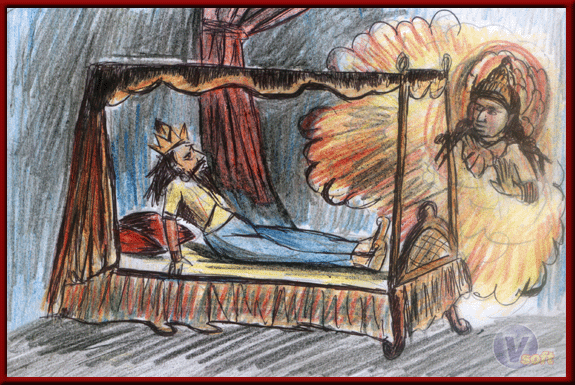257. The Bodhisatta As A God Living In Sal Tree

Once upon a time, when Brahmadatta ruled as king in Benares, and observed the Ten Royal Virtues, he thought to himself: “All over India the kings live in palaces supported by many a column. There is no marvel, then, in a palace supported by many columns; but what if I make a palace with one column only to support it? Then I shall be the chiefest king of all kings!” so he summoned his builders, and told them to build him a magnificent palace supported on one column. “Very good, said they, and away they went into the forest.
There they beheld many a tree, straight and great, worthy to be the single column of such a palace. “Here are these trees,” said they, “but the road is rough, and we can never transport them; we will go ask the king about it.” When they did so, the king, said, “By hook or by crook you must bring them, and that too quickly.” But they answered, “Neither by hook nor by crook can the thing be done.” “Then,” said the king, “search for a tree in my park.”
The builders went to the park, and there they saw a lordly sal tree, straight and well grown, worshipped by village and town, and to it the royal family also were wont to pay tribute and worship; and they told the king. Said the king, “In my park ye have found me a tree; good–go and cut it down.” “So be it,” said they, and went to the park, with their hands full of perfumed garlands and the like; then hanging upon it a five-spray garland, and encircling it with a string, fastening to it a nosegay of flowers, and kindling a lamp, they did worship, explaining, “On the seventh day from now we shall cut down this tree; it is the king’s command so to cut it down. Let the deities who dwell in this tree go elsewhere, and not unto us be the blame.”
The god who dwelt in the tree hearing this, thought to himself: “These builders are determined to cut down this tree, and to destroy my place of dwelling. Now my life only lasts as long as this my abiding place. And all the young sal trees that stand around this, where dwell the deities my kinsfolk, and they are many, will by destroyed. My own destruction does not touch me so near as the destruction of my children; therefore I must protect their lives.” Accordingly at the hour of midnight, adorned in divine splendor, he entered into the chamber of the king, and filling the whole chamber with a bright radiance, stood weeping beside the king’s pillow. At sight of him the king, overcome by terror, asked:
“Who are you, standing high in air, with heavenly gesture swathed:
Whence come thy fears, why flow the tears in which thine eyes are bathed?”
On hearing which the king of the gods replied:
“Within thy realm, O King, they know me as the Lucky Tree:
For sixty thousand years I stood, and all have worshipped me.
Though many a town and house they made, and many a king’s dwelling,
Yet me they never did molest, to me no harm did bring:
Then even as they did worship pay, so worship thou, I king:”
Then the king said:
“But such another mighty trunk I never yet did see,
So fine a king in girth and height, so thick and strong a tree.
A lovely palace I will build, one column for support:
There I will place thee to abide– thy life shall not be short.”
On hearing this the king of the gods replied:
“Since thou art bent to tear my body from me, cut me small,
And cut me piecemeal limb from limb, O King, or not at all.
Cut first the top, the middle next, then last the root of me:
And if thou cut me so, O King, death will not painful be.”
Then the king said:
“First hands and feet, then nose and ears, while yet the victim lives,
And last of all the head let fall–a painful death this gives.
O Lucky Tree! O woodland king! What pleasure could you feel,
Why, for what reason dost thou wish to be cut up piecemeal?”
Then the Lucky Tree answered:
“The reason (and a reason it is full noble) why piecemeal
I would be cut, O mighty king! Come listen while I tell.
My kith and kin all prospering round me well-sheltered grow:
These I should crush by one huge fall,–and great would be their woe.”
The king, hearing this, was much pleased: It is a worthy god this,” thought he, “he does not wish that his kinsfolk should lose their dwelling-place because he loses his; he acts for his kinsfolk’s good.” And he replied:
“O Lucky Tree! O woodland king! Thy thoughts must noble be:
Thou wouldst befriend thy kindred, so from fear I set thee free.”
The king of the gods, having discoursed to this king, then departed. And the king being established according to his admonition, gave gifts and did other good deeds, toll he went to fill the hosts of heaven.


Leave a Reply